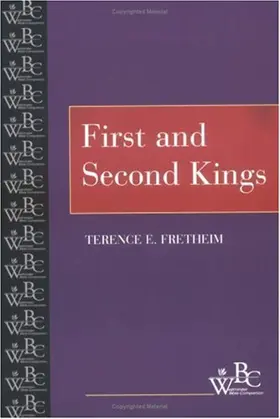

First and Second Kings
in Westminster Bible Companion
Pages
228 pages
Publisher
Westminster John Knox
Published
4/1/1999
ISBN-13
9780664255657
Collections
This book appears in the following featured collections.
- Commentaries I Would Not Do Without by R. Hansen
Reviews
Excellent! Fretheim doesn't disappoint as usual.
Outstanding commentary! It is great for pacing personal study and/or a teaching curriculum. Uniquely, Fretheim not only highlights the fact that God works in the world but also HOW God works in the world.
This is not an in depth commentary but very good. He is very helpful in following the point of the author and does well with theology and application. After Leithart, this is the second most helpful commentary on Kings that I have used. Excellent!
A popular discussion that focuses on the literary and rhetorical direction and purpose of the texts.
[Full Review]
The Westminster Bible Companion series of study guides to the Bible is written specifically for the laity and seeks "to help the laity of the church read the Bible more clearly and intelligently" (p. ix). Because of this focus, much of the presentation of issues that are debated among scholars is presented as though it were the consensus. This is not intended as a criticism of this volume; rather, it is a notice about the scholarly constrictions an author faces in producing this type of commentary. Fretheim briefly places the books of Kings within the context of the Deuteronomistic History, noting that its composition occurred in two major editorial stages–one pre-exilic, the other exilic. Within this context, the non-specialist might have benefited from a more extensive explanation of why the distinction between "biblical Israel" and "historical Israel" constitutes an "overreaction" on the part of some scholars (p. 10). This observation seems to detract from the presentation of the hortatory nature of the book itself, which Fretheim approaches as "theological literature" (p. 14). Fretheim identifies three major themes around which the narrative accounts of Kings are structured: apostasy, judgment, and promise. He also emphasizes the role which the prophetic word, both its announcement and its often delayed fulfillment, plays in guiding the development of the materials. He directs the reader's attention to the various ways in which the Davidic Covenant, in tension with the concept of the Mosaic Covenant, is presented throughout the work, thus contributing to the ambiguities that remain at the book's conclusion. Fretheim divides Kings into its major thematic units and provides two types of commentary on Kings. Each section receives a general commentary that addresses the narrative form of the work. In forty-three additional segments, he provides what he calls "theological reflections" on key themes and concerns of the narrative.
[Full Review]
The stated intention of this series is "to help the laity of the church read the Bible more clearly and intelligently." And it must be said at the outset that F.'s volume fulfills this intention. It gives the reader a clear sense of the historical, literary, and theological context of the books of Kings without being too technical. The commentary is narrative in format rather than verse-by-verse, and this contributes to the book's readability. The exposition is well written and engaging. Moreover, F. is persuaded that Israel's life "mirrors the life of the people of God in our own time" (p. 3) to a larger extent than is initially apparent. Hence, he includes 43 "theological reflections" on a wide variety of topics interspersed throughout the commentary. While F. clearly writes for a Christian audience his commentary and theological reflections are not as overtly christological as one might have expected, so that non-Christians may also profit from them. The basis of the commentary is the NRSV. The biblical text is generally supplied, but not always, and it is not clear why certain sections are omitted. Fretheim treats the books of Kings as part of the Deuteronomistic History, and he favors the double redaction theory of the DtrH's composition. He does not attempt systematically to distinguish editorial levels in this commentary, but he does make the blanket statement that the writer(s) behind the DtrH were more editors than authors (p. 6). This leads him, in my view, to a misunderstanding of the books of Kings that is a potential source of confusion for his readers. First, while F. rightly notes the importance of prophets in Kings, he fails, strangely, to point out the structural role of the oracles against the dynasties (1 Kgs 14:7-14; 16:1-4; 21:17-24) and their fulfillment notices (1 Kgs 15:27-30; 16:11-13; 2 Kgs 9:5-10, 25-26, 36-37).
[Full Review]




